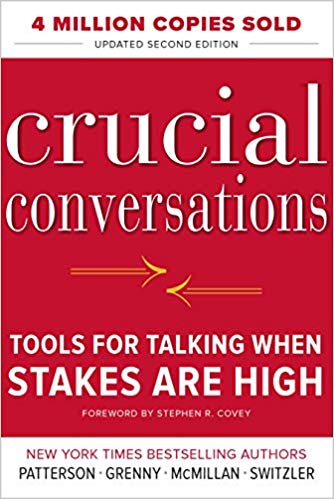

This article is an excerpt from the Shortform summary of "Crucial Conversations" by Kerry Patterson. Shortform has the world's best summaries of books you should be reading.
Like this article? Sign up for a free trial here .
What does Crucial Conversations‘ “master my stories” mean? How can you use the “master my stories” concept to be a better communicator?
With the Crucial Conversations “master my stories” principle, you’ll understand how to communicate how you feel and how you see things in a difficult conversation, and how to stay aware of issues you may be causing in the conversation.
What Does Crucial Conversations “Master My Stories” Mean?
Stories are your rationale for what’s going on. They’re your interpretations of the facts, helping to explain what you see and hear. They explain why, how, and what: Why did the other person act that way? How should I interpret it? What should I do? And what is the crucial conversations “master my stories” concept?
As we come up with our own interpretation or stories, our body responds with strong emotions. It happens instantaneously — we tell the story and our temper flares before we know it. For example, when someone laughs at us, we take it as an insult and feel a surge of anger instantly without consciously thinking about it.
At first, we control our stories as we tell them, but once they’re told, the stories control us. They dictate how we feel, and then how we act. As a result, our stories control the outcomes of our crucial conversations.
However, the same set of facts can be used to spin infinite stories. We can tell different stories and break the emotions/actions loop. Using the “master my stories” technique in crucial conversations helps you get ahold of that emotional justification.
If you want more positive results from your crucial conversations, change the stories you tell yourself, even in the heat of the moment.
Skills for Mastering Your Stories
In crucial conversations, master your stories is meant to help you understand and convey your perspective. To slow down your story-telling process and adrenaline rush, retrace your Path to Action one step at a time (going backward to the triggering event, starting with how you’re behaving):
- Act: Examine your behavior. Ask: How am I acting — with silence or violence?
- Feel: Identify your feelings. Ask: What emotions are driving me to act this way?
- Tell story: Question your stories. What story is creating these emotions?
- See/hear: Examine the facts. What observable evidence (which can be seen/heard) do I have to support this story?
By retracing your path, you enable yourself to think about, question, and change one of more of the elements.
1. Examine Your Behavior
You can get a sense of the Crucial Conversations “master my stories” principle by examining your behavior. If you realize you’re slipping into silence or violence (being verbally aggressive), stop and take stock. Take an honest look at what you’re doing. Don’t try to justify your actions. If you tell yourself your violent behavior is a necessary tactic, you won’t see the need to reconsider your actions.
To be objective, consider how others would see your actions
2. Identify Your Feelings
After examining your behavior, the next step in retracing your path is exploring your feelings.
Identifying your emotions can be difficult — many people can’t accurately describe their feelings. They might say they’re angry when they’re feeling embarrassment and surprise. Or they might not realize it when they’re angry. All these skills help with the technique of “master my stories” in crucial conversations.
To develop emotional literacy:
- When experiencing strong emotions, stop and think about your feelings.
- Use specific, accurate descriptions (rather than saying something general, like you’re bummed out).
- Talk openly with others about how you feel.
- Expand your emotional vocabulary by learning to specifically describe a range of feelings.
Knowing what you’re really feeling helps you take a more accurate look at what is going on and why. You’re more likely to take an honest look at the story you’re telling yourself if you can admit your true feelings.
3. Question Your Stories
Once you’ve identified what you’re feeling, stop and ask: Is that the right emotion under the circumstances? Is this the right way to master my stories in crucial conversations? Challenge the illusion that what you’re feeling is the only right emotion under the circumstances.
By questioning your feelings, you open yourself up to question your stories. Question whether the emotions and the story behind them (which is only one of many possible explanations) are accurate.
Don’t confuse stories with facts: When you generate stories instantly, you get so caught up in the moment that you begin to believe your stories are facts. You confuse subjective conclusions with data/facts. (Remember: Stories are our interpretations of facts.)
Crucial Conversations: Master My Stories, Examine the facts
Focus on what’s observable, for instance on what someone said or did. Ask yourself: Am I focusing on an actual behavior or a conclusion? What somebody did is objective and verifiable. What you think about what the person did is a subjective conclusion.
In crucial conversations, “master my stories” means being aware of your own emotional response. Watch for emotionally charged terms: She scowled at me; he made a sarcastic comment (these express judgments). Judgments and attributions create strong emotions; they are stories, not facts. Less volatile descriptions allow for broader interpretations of someone’s behavior.
4. Beware of ‘Clever Stories’
Our stories fall into one of two categories:
- Accurate stories that motivate constructive behavior.
- Inaccurate stories that justify our current behavior so there’s no need to change.
The second category comprises clever stories, which allow us to feel good about behaving badly.
They often start with a sellout — an instance in which we’ve consciously acted against what we know is right. For example, our sellout may be that we refused to let someone merge into traffic when we should have. After the fact, we tell a story characterizing the other person as a bad driver to justify our rude behavior.
With Crucial Conversations‘ “Master My Stories,” you can make sure that you’re getting your point across. The “master my stories” technique also helps ensure you’re using your best listening skills, and working on solving the problem with communication.

———End of Preview———
Like what you just read? Read the rest of the world's best summary of Kerry Patterson's "Crucial Conversations" at Shortform .
Here's what you'll find in our full Crucial Conversations summary :
- How to approach an argument without getting mad
- The mistakes most people make when trying to listen to someone else
- How to come up with win-win solutions that make everyone happy






